Recently, the finals of the 7th China Collegiate Contest - Mobile Application Innovation Contest in 2022 came to a perfect conclusion. The competition lasted for half a year, recording and witnessing the efforts made by students from 707 universities at home and abroad for innovation and entrepreneurship, showing us the infinite possibilities for the development of mobile applications in the future. Taking into account the reasons for Covid, this final was divided into 24 online teams and 41 offline teams and selected out the first, second, third prizes and the most innovative award etc. Students from Shanghai Jiao Tong School of Design has received 9 awards, including a First Prize, four Second Prize, three third prizes, and a Social Innovation Award. In addition, Associate Professor DOND Zhanxun and Associate Professor LIU Zhao won the Outstanding Instructor Award, and Shanghai Jiao Tong University received the Outstanding Organization Award.

First Prize & Social Innovation Award
Project Name: Starrypia —— an AR gamified music therapy app for children with Autism
Project Members: TAN Yilan, ZHANG Junwei, CAI Yu
Project Instructors: DONG Zhanxun, LIU ZHao
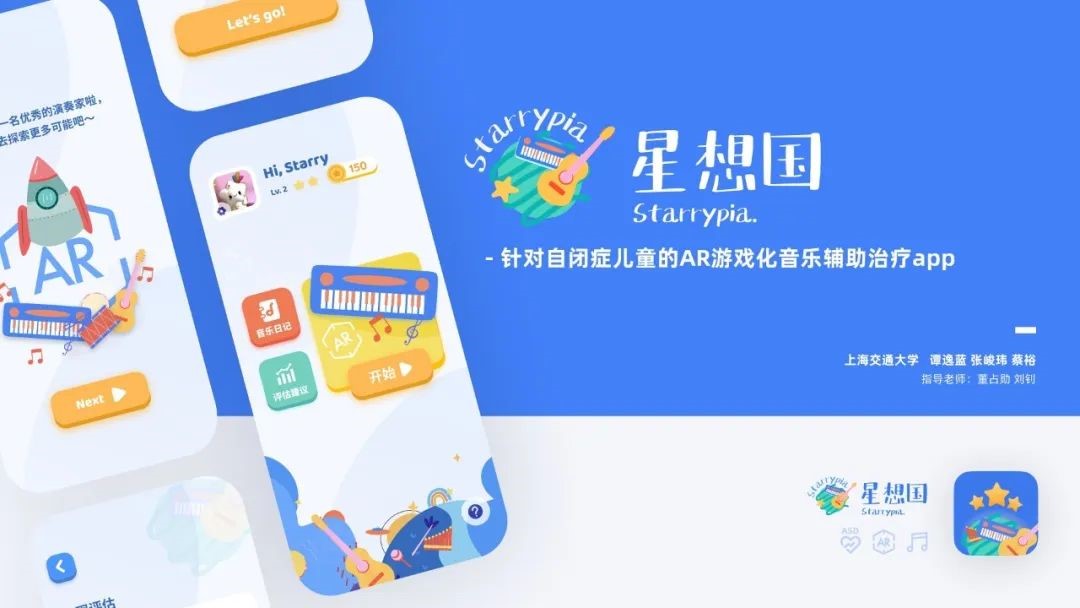
Starrypia makes music therapy to be lighter and gamified, enabling autistic children to generate music clips while actively exploring through object recognition, algorithm generation and AR technology, interact with cartoon characters for visual arrangement, and combine visual, listening and interaction to produce their own unique music. In the process of exploration, arrangement and interaction, autistic children gradually explore nature, accept music under guidance, and be encouraged to express themselves in a creative way.
Perhaps for the children of stars, Starrypia is just a small window for them to observe the world, but as long as they are willing to open their hearts, their creativity will be seen by the world. We always believe that nature and art are eternal languages, which also echo what we hope. Starrypia has echoes, and children have stars in their eyes.
Second Prize
Project Name: Let's go! Electric Car
Project Members: WAN Xinyue, ZHANG Liuxin
Project Instructors: LIU Bo, LIU Zhao
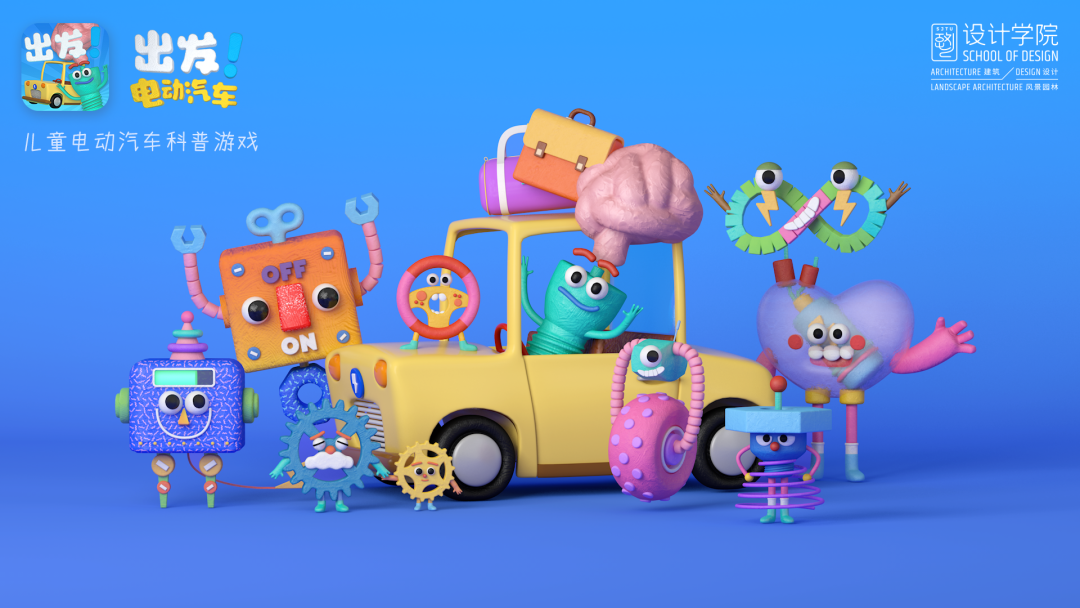
Mobile interactive science game is a new field that focuses on the development of the popular science industry, conveying the scientific method and spirit through game play, it consists of the development of science, technology and culture. There are already a wide variety of popular science games available in China.
However, rarely games for children that focus on electric cars. As a type of new energy vehicle, electric cars are not only innovative in terms of technology, but also have profound environmental implications. The former explores the spirit of science, while the latter explores the spirit of humanity.
Let's go! Electric Car is an interactive science game for children with both scientific education and natural humanistic care. It uses AR reality, games and voice dialogues to briefly explain the basic structure of electric cars to children, enabling them to experience the game in a more immersive way, to understand the educational meaning and scientific enlightenment contained in the game, and to stimulate children's concern for the natural world and environmental protection, planting the seeds of The game will also inspire children to care about the natural world and environmental protection, and plant the seeds of creating a better world through technology.
Project Name: Face Hi
Project Members: HAN Shuchang, LIU Hongyu
Project Instructors: DONG Zhanxun
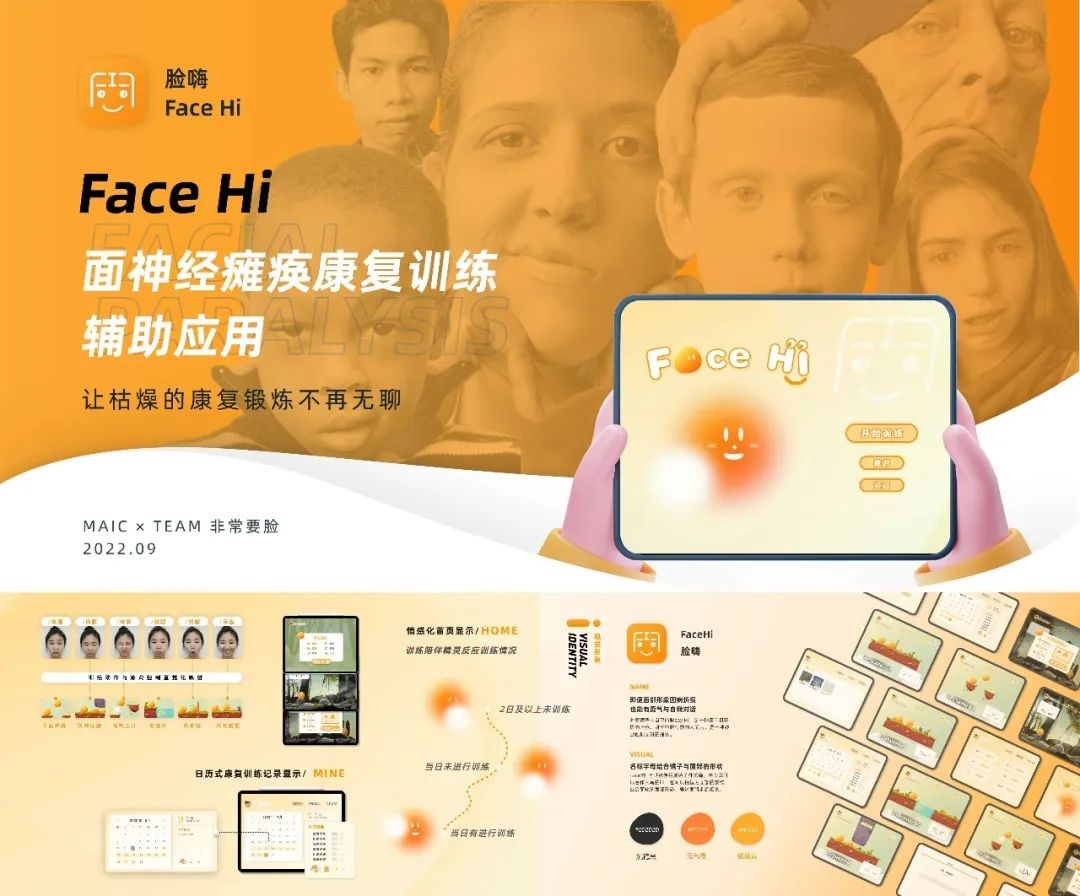
Nerve palsy is also commonly known as facial paralysis, and its incidence in China continues to rise, regardless of age or gender. Facial muscle training is one of the most common treatment methods in clinical practice, and patients can practice on their own after being guided by a physician. Facial muscle training can be divided into 6 training steps: raising eyebrows, closing eyes, shrugging nose, puffing cheeks, nuzzling mouth, and showing teeth. However, for patients, there are some shortcomings, such as: high repetition of training movements and boring process, resistance to face the mirror because of facial impairment, lack of timely positive feedback etc. These can reduce patient compliance.
Thus FaceHi team has carefully designed an intuitive response, transforming training actions into controlling game characters with facial actions to deal with different obstacle scenarios, allowing users to experience the fun of training games with low learning costs. It focus the details of more emotional care and empathy, and hopes that users can participate in rehabilitation training in a more relaxed and positive way and regain health and self-confidence.
Project Name: MULTIVISION
Project Members: LI Yahong, LI Junjie, HOU Kaiyuan
Project Instructors: DONG Zhanxun, ZHU Homing (From Tongji University)
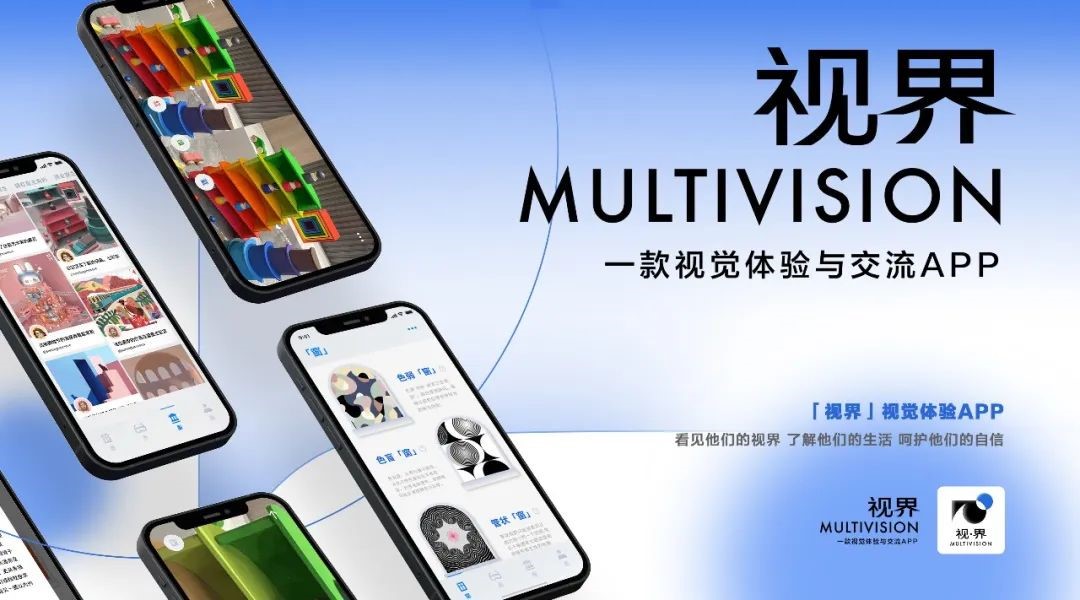
Approximately 200 million people worldwide have visual abnormalities. The symptoms of abnormal vision mainly include color blindness, color weakness, blurred vision, tubular vision and so on. These symptoms cause great obstacles to the life of visually impaired people. The MULTIVISION APP gives us the opportunity to experience the vision of visually impaired people proactively. Through the APP, users can experience the world in the eyes of visually impaired people, understand their lives, satisfy people’s curiosity, arouse empathy, and protect the self-confidence of visually impaired people.
According to the different features of the visual abnormalities, such as color blindness, color weakness, infants' and the elderly’s vision, the MULTIVISION APP opens different experience "windows", which can compare the real-time differences of different visions in front of the camera, experience the abnormal vision's features more intuitively, and understand the feelings of people with abnormal vision. Meet the needs of the "window owner" relatives and friends. For the designer group, it is a tool to verify whether their designs are friendly to visually impaired people. In addition, the APP can also be used with the AR glasses box to experience the special vision more immersive.
It is expected that the MULTIVISION APP will make the world more beautiful and inclusive to visually impaired people. Although we got different horizons, we share happiness equally.
Project Name: Starry night
Project Members: FAN Yige, YUE Jiatong, HE Qi
Project Instructors: HAN Ting, XUE JIao
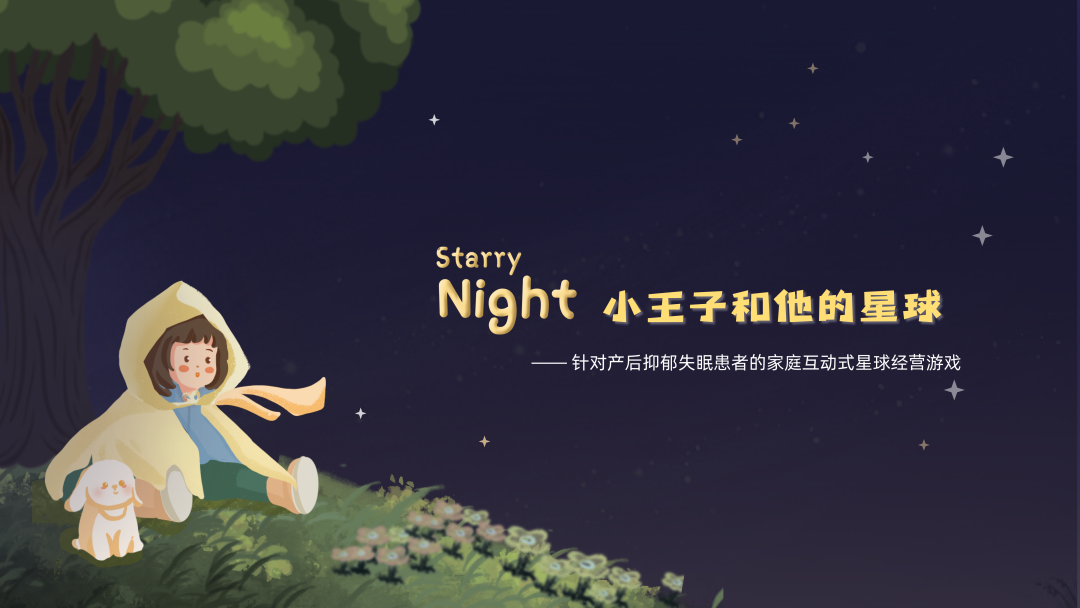
"Starry Night" takes the little prince and her planet as the storyline, and focuses on family interactive healing management gameplay. We have gamified healing methods such as postpartum exercise recovery, knowledge popularization, and emotional evaluation, then built a scientific multi-dimensional evaluation system. This product allows patients with postpartum depression to receive a customized chemotherapy treatment plan in the game, feel the support and company of their family members, and gradually recover.
Third Prize
Project Name: REHAB+
Project Members: XIA Tian, WANG Xinyue, WEI Yiwen
Project Instructors: HAN Ting
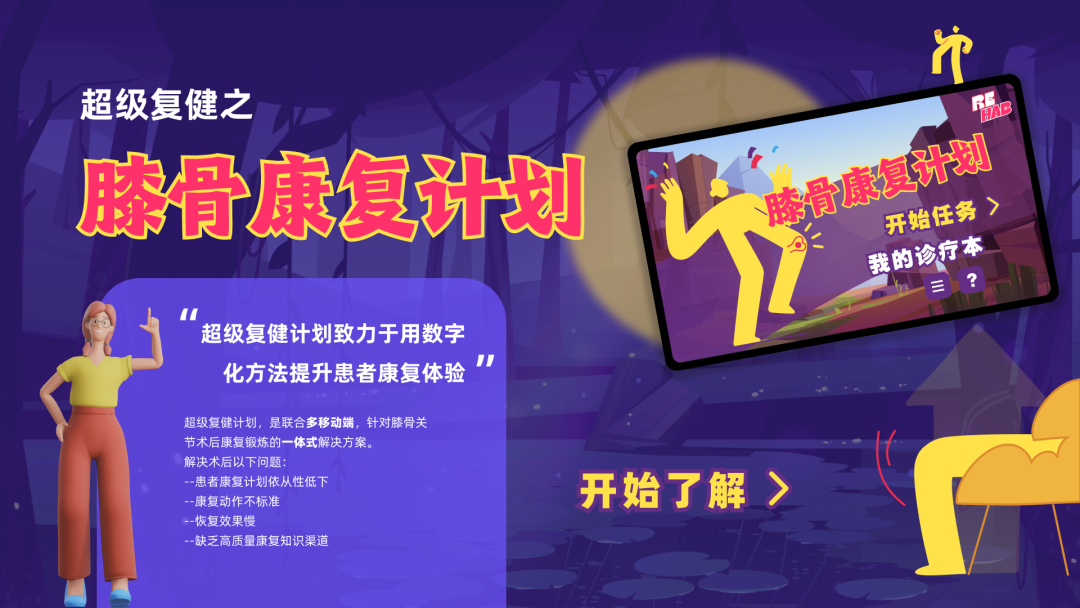
The REHAB+ Program is dedicated to digitally enhancing the patient recovery experience. Behind the annual volume of more than 950,000 knee replacement surgeries, the poor rehabilitation conditions of the elderly, the shortage of rehabilitation specialist resources, and the fast-paced schedule of hospital operations have resulted in unsatisfactory rehabilitation intervention effects for nearly 40% of elderly patients.
Therefore, in the post-epidemic era, we focus on postoperative home rehabilitation. By combine design and technology, REHAB+ provide digital home rehabilitation solutions for patients after bone and joint replacement surgery. It creates virtual rehabilitators, a gamified way to correspond rehabilitation tasks to stage achievements, and establishes a linear exercise process to lower the learning threshold. In terms of information presentation, the results are quantified in an easy-to-understand way, and patients can understand the recovery process within a minute. From the doctor’s side, information barriers are broken down, and an intuitive database is used for the hierarchical management of patients.
Project Name: Magic Slime - Car Children
Project Members: JI Jie, CHEN Zhiying, GAO Xiao
Project Instructors: LIU Bo, LIU Zhao

The research found that nearly 1/3 of children will cry in the car, affecting the safety of driving. In this sense, we create a car companion genie to relieve children's anxiety in the car.
We pioneered the idea of sticking the IPAD on the car window, so that the operation can make the sight resonate with the picture and prevent vertigo. The rear camera of the IPAD shoots the view outside the car window in real time, and the front camera extracts children's gestures to interact with the character.
Project Name: MUSEE
Project Members: WEI Ye, PENG Tiaoyao, CHEN Cheng
Project Instructors: DONG Zhanxun
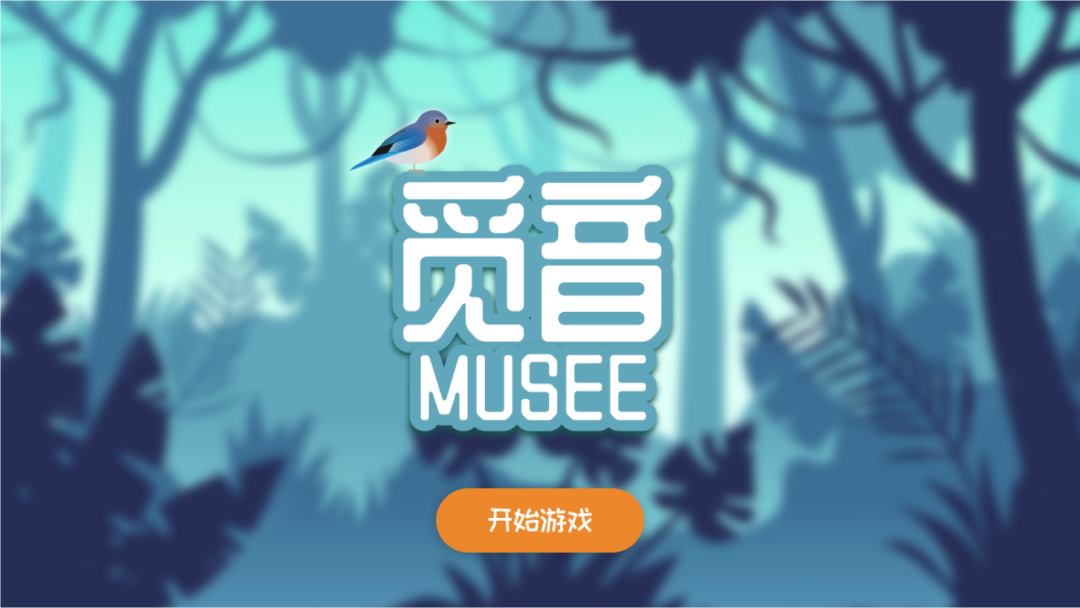
MUSEE is personalized music composing software for children. We designed this software to meet the needs of children's habits and professional music knowledge, because of the low participation of users, the lack of music expertise, and the high difficulty of music composition software in the market today.
Children will experience the four parts of "Music Forest", "Master Stage", "Rhythm House" and "Album Studio" in order to create their first "music album" following the guidance of the software.

